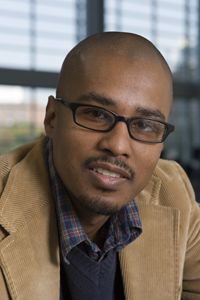Q&A with Avery August
Avery August, professor and chairman of the immunology department at Cornell University College of Veterinary Medicine, talks about his research and interests and shares some of the challenges he faced in his scientific development.
Tell us about your current career position.
I am leaving a position as distinguished professor of immunology and director of the Center for Molecular Immunology & Infectious Diseases at Penn State University to become chair of the Department of Microbiology & Immunology in the College of Veterinary Medicine at Cornell University. In this position, I will have administrative duties in chairing the department, but will also spend significant amount of time devoted to continuing my research into signal transduction pathways that regulate T cell and mast cell function in vivo, as well as continuing to investigate the molecular mechanism of allergic airway inflammation.
What are the key experiences and decisions you made that have helped you reach your current position?
I have always been willing to give my very best in any activity I am involved in. I also feel very strongly about mentoring students, postdocs and junior faculty members in their careers. My decision to start my academic career at Penn State University has allowed me to be quite involved in such activities.
How did you first become interested in science?
I have been interested in science since high school, when I used to perform crude chemistry and biology experiments in my back yard.
Were there times when you failed at something you felt was critical to your path? If so, how did you regroup and get back on track?
There were times in college when I was not on the right track to be successful in science. I have had caring professors, including Dr. Costello Brown, Dr. Raymond Garcia, Dr. Phoebe Dea and Dr. Carlos Gutierrez at California State University at Los Angeles. They were all very supportive and pulled me back on track. In particular, Dr. Dea allowed me in her lab to do research for the first time in my life. Without their support, and the support of the RIMI program, I would not have been able to make it. In graduate school, during those nether years when the end seemed far away, Dr. Bo Dupont’s patience allowed me the freedom to pursue my interests in his lab. Finally, my early attempts at getting independent funding were not successful and forced me to reevaluate what I wanted to work on.
What advice would you give to young persons from under-represented backgrounds who want to pursue a career in science similar to yours?
I would strongly recommend getting exposed to as much science (of any form) as early as possible. Get research experience! Be quantitative and always be prepared to do your best work in whatever setting. Second chances at first impressions don't usually occur. Ignore the minor issues and focus on the ones you can handle.
What are your hobbies?
I enjoy mixing electronic music, playing soccer and watching foreign movies.
What was the last book you read?
The last nonscience book I read was "Tinker, Tailor, Soldier, Spy" by John Le Carre. The last book I read was "Guns Germs and Steel: The Fates of Human Societies" by Jared Diamond.
Do you have any heroes, heroines, or role models? If so, describe how they have influenced you?
My heroine is my mother, who made great sacrifices to make it possible for her children to get a chance at being successful. I have been influenced by Mahatma Gandhi, Martin Luther King, Bob Marley, Nelson Mandela and my post-doc advisor Hidesaburo Hanafusa.
What is it that keeps you working hard and studying science every day?
The satisfaction of seeing members of my lab make exciting discoveries, seen for the first time, and sharing that with them keeps me working. The satisfaction of seeing students come in not knowing how to use a pipette and leave brimming with excitement about a future in science makes it all worth it.
Enjoy reading ASBMB Today?
Become a member to receive the print edition four times a year and the digital edition monthly.
Learn moreGet the latest from ASBMB Today
Enter your email address, and we’ll send you a weekly email with recent articles, interviews and more.
Latest in People
People highlights or most popular articles

From humble beginnings to unlocking lysosomal secrets
Monther Abu–Remaileh will receive the ASBMB’s 2026 Walter A. Shaw Young Investigator Award in Lipid Research at the ASBMB Annual Meeting, March 7-10 in Washington, D.C.

Chemistry meets biology to thwart parasites
Margaret Phillips will receive the Alice and C. C. Wang Award in Molecular Parasitology at the ASBMB Annual Meeting, March 7-10 in Washington, D.C.

ASBMB announces 2026 JBC/Tabor awardees
The seven awardees are first authors of outstanding papers published in 2025 in the Journal of Biological Chemistry.

Decoding how bacteria flip host’s molecular switches
Kim Orth will receive the Earl and Thressa Stadtman Distinguished Scientists Award at the ASBMB Annual Meeting, March 7–10, just outside of Washington, D.C.

Thiam elected to EMBO
He was recognized during the EMBO Members’ Meeting in Heidelberg, Germany, in October.

The timekeepers of proteostasis
Learn about the cover of the winter 2026 ASBMB Today issue, illustrated by ASBMB member Megan Mitchem.
